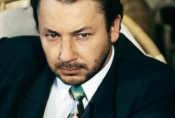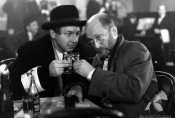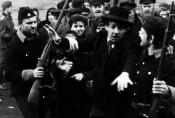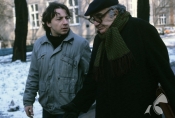Zbigniew Zamachowski
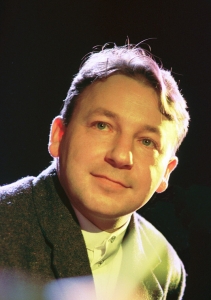
“Most of Zamachowski’s film roles to date have been either supporting or minuscule cameos. Fortunately, often very distinctive, leaving a powerful impression, allowing him to demonstrate his brilliant talent,” Stanisław Zawiśliński wrote in his book Zamach na Zamachowskiego [An attempt at Zamachowski], published in 1994. Some things have changed since the book’s publication, he has had several major roles, but regardless of their “size” all his performances are powerful and memorable.
He was born on July 17, 1961 in Brzeziny near Łódź. He is a graduate of the Acting Department of the State Higher School of Film, Television and Theatre in Łódź (1985). Immediately after graduation, he joined the Studio Theatre in Warsaw, where he worked until 1997. Then, he moved to Narodowy Theatre. He often appeared in theatrical productions and television shows, as well as cabarets and song concerts. Winner of many prestigious awards, including the Wyspiański Award (1989), the Zbigniew Cybulski Award (1990), the Aleksander Zelwerowicz Award (1993), the Aleksander Bardini Award (1997), three “Wiktors” (1992, 1993, 1997) and two Golden Ducks (1995, 2002).
He first appeared on screen (in one of two main roles) in the Wielka majówka [Great May Picnic] (1981) by Krzysztof Rogulski, a story about the friendship between two boys, who – accidentally coming to own a large sum of money – decide to treat themselves to the title “picnic.” It was ten years before he got another starring role – in Tak tak/Yes yes (1991) by Jacek Gąsiorowski. Still, he played some extremely interesting supporting roles in the meantime, such as prince Bulbo in the film version of Ring and Rose by Thackeray (1986) directed by Jerzy Gruza, and one of the passengers stuck on a train on New Year's Eve during the harshest winter of the century on a tiny station in Bal na dworcu w Koluszkach/The Ball at Koluszki Railway Station (1989) by Filip Bajon or the assistant censor in Ucieczka z kina “Wolność”/Escape from the Liberty Cinema (1990) by Wojciech Marczewski. The latter performance earned him a nomination for the European Film Award (1991).
He gave a memorable performance as the Polish hairdresser in Paris in Biały/White (1993), the second part of Krzysztof Kieslowski's triptych Trzy kolory/Three Colours. Then, Zamachowski played several roles in Kazimierz Kutz’s films: in the bittersweet Zawrócony/The Convert (1994) he played Tomasz Siwek, an honest and good-intentioned man, who suffers the consequences of the changing reality, and in Pułkownik Kwiatkowski/Colonel Kwiatkowski (1995), a brilliant story about a doctor pretending to be a communist colonel in post-war Poland, he was Dudek, Kwiatkowski’s devoted aide. For his performance in Zawrócony/The Convert, Zamachowski won the best actor award at the festival in Gdynia (1994). Ten years later, he received another award there, this time for his role in Zmruż oczy/Squint Your Eyes (2004) by Andrzej Jakimowski. It is the story of Jasiek, a man from the city, an unfulfilled writer, leading a quiet life “somewhere at the end of the world,” working as a watchman guarding the property of a former state farm, and a 10-year-old girl who ran away from home, preferring the company of her former teacher over her rich parents. Two years later he starred in Przybyli ułani [The uhlans came] (2005) by Sylwester Chęciński, for which he was also awarded in Gdynia.
Zbigniew Zamachowski appeared in over one hundred films and television series, creating many memorable characters. Some of his performances escaped the notice of the critics and judges at various film festivals and competitions, such as his role of the husband, whose wife dies in a car accident, leaving “the whole house upside down” in a subtle film by Teresa Kotlarczyk Odwiedź mnie we śnie [Come to me in a dream] (1996), and as the crippled doorman Edzio, starved for emotions just like the title heroine of Robert Gliński’s drama Cześć, Tereska/Hi, Teresa (2001), a haunting story about cruel reality which crushes naive dreams and turns frustration into aggression.
Jerzy Armata
Selected filmography
-
1990
ESCAPE FROM THE 'LIBERTY' CINEMA
reż. Wojciech Marczewski

